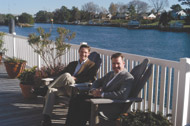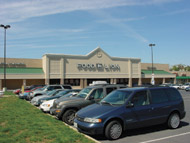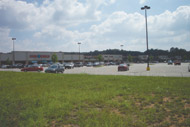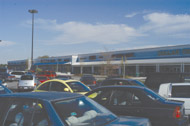|
COVER STORY, JANUARY 2005
GEOGRAPHIC & ASSET DIVERSITY
Coastal Capital Partners continues to expand its portfolio
in the Southeast and Mid-Atlantic.
Julie F. Hunt
 |
|
Charles Moore (left) and Kevin
DiBona at Coastal Capital Partners’ office
in Virginia Beach, Virginia.
|
|
Coastal Capital Partners, LLC, a real estate investment firm
based in Virginia Beach, Virginia, recently celebrated its
third anniversary, and the firm has a lot to show for it:
Since Southeast Real Estate Business last met with founders
Charles W. Moore and Kevin A. DiBona at the end of 2002, Coastal
Capital Partners has increased its property acquisitions from
three to 10 and added a chief financial officer who also runs
the property management side of the business.
The team has another major announcement to make: After moving
to Virginia Beach in 2002 to consolidate offices, Moore, who
originally headed the Atlanta office, is moving back to Atlanta
to reestablish the company’s presence in the South.
“I think you need to be able to get to your properties
in order to manage them properly and understand the markets,”
says Moore. “Right now we want to be in Florida; I think
that’s a market we’re going to focus on. We’ve
also got five properties that are within a few hours’
drive from Atlanta.”
 |
|
In August 2003, Coastal Capital
Partners purchased
Port Crossing Shopping Center, a 56,960-square-foot,
Food Lion-anchored center in Harrisonburg, Virginia.
|
|
“Reopening the Atlanta office is very important for
us,” DiBona adds. “It will allow Charles to cover
the South more effectively. Our leasing team is going to be
[in Atlanta] as well. I believe many opportunities will be
available to us in the South.”
The firm manages all 10 of its properties, which are located
in Brunswick, Vidalia and Hinesville, Georgia; Gulfport, Mississippi;
Reidsville, Tarboro and Biscoe, North Carolina; Decatur and
McCalla, Alabama; and Harrisonburg, Virginia.
“Right now, five of [our properties] are Wal-Mart shadow-anchored
centers, and five of them are grocery-anchored centers,”
says Moore. (Please see chart below for details.)
Coastal Capital Partners looks for high-quality assets in
rural and urban areas. The company remains focused on the
Southeast and Mid-Atlantic, and hasn’t spread itself
too thin by buying outside of the specific geographic region
it set at the beginning. The closely held company also has
a small group of investors — the same investors that
have been with the firm from the beginning.
 |
|
In October 2004, Coastal Capital
Partners purchased
The Shoppes at Letson Farms, a Food World-anchored,
95,092-square-foot center in McCalla, Alabama.
|
|
“We’ve managed to keep the company small,”
says Moore. “I think that’s a benefit to us, because
we don’t have to buy properties in order to pay our overhead.
We make the decision based on the real estate and not on our
company’s cash flow requirement, and that’s how
we’ll always be.”
“Charles and I have refused to change our underwriting
criteria, and I think that’s one of the great things
we’ve done,” DiBona notes. “We haven’t
bought as many deals as we thought we would — we have
10 deals now, and we thought we would have 15 to 20 at this
point. But that’s okay, because we’re going to stick
with our program.”
“The interest rate environment has helped us like everybody
else,” says Moore. “But, even with the benefit of
that leverage, we pass on a lot of deals. If it doesn’t
work within the model, if our returns aren’t where we
need them to be, we don’t buy it.”
Most of the company’s product is new construction, although
it does own a few older centers. “We are yield-driven,
so it has to fit in terms of being able to provide the yield
that we require,” Moore says.
In small markets, Coastal Capital Partners likes to be the
in the shadow-anchored product because of the extended trade
area that comes with a Wal-Mart Supercenter. “It’s
not just going to be the 12,000 to 20,000 people within the
immediate area, it’s going to be a five-county trade
area,” Moore explains. “If it’s a little bit
larger market, then the grocery-anchored centers are great
product.”
Small or large, the company is always looking for product
in growth markets.
 |
|
In January 2004, Coastal Capital
Partners purchased River Oaks Landing, a 32,800-square-foot
shopping center located in Tarboro, North Carolina,
that is shadow-anchored by Wal-Mart Supercenter.
|
|
“I think our last purchase is a good example of targeting
a growth area,” DiBona says of The Shoppes at Letson
Farms, a newly developed 95,092-square-foot, Food World-anchored
shopping center in McCalla. “Within a 5-mile radius of
the center, there are 22 new neighborhoods under construction
with significant homes in each one. Of course, we also buy
in stable markets, but our preference is growth.”
The company closed on The Shoppes at Letson Farms in October
2004. “This last purchase was our largest deal; it was
just over $13 million,” says DiBona. “We’re
going to try to focus on larger deals now; I think you’ll
see us trying to buy assets in the $15 million to $25 million
range. That’s our goal over the next year or two.”
When considering which centers to purchase, opportunity drives
Coastal Capital Partners’ decision. “We have plenty
of capital,” says DiBona. “We could by 20 centers
in a year, or we could only buy one. It’s going to depend
upon finding the right asset and making sure that each one
works in our formula. We’re not going to stretch and
try to buy something that doesn’t fit. So a lot of it’s
market-driven. As soon as things calm down in the market and
cap rates return to a more realistic level, you will see us
buying a lot more assets.”
©2005 France Publications, Inc. Duplication
or reproduction of this article not permitted without authorization
from France Publications, Inc. For information on reprints
of this article contact Barbara
Sherer at (630) 554-6054.
|
